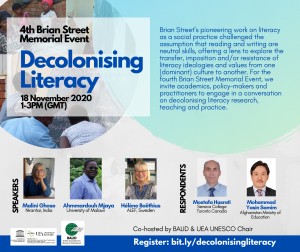 18 November 2020 IT WAS OUR PLEASURE to co-host Decolonising Literacy with the UNESCO Chair at the University of East Anglia. This was the fourth Brian Street Memorial event since his death in 2017. With many international participants, this was a stimulating and informative webinar, with 250 registrants from 30 countries, and a 50/50 split between academics and policy-makers/practitioners. You can watch a recording by using this passcode: F6JK4cn#
18 November 2020 IT WAS OUR PLEASURE to co-host Decolonising Literacy with the UNESCO Chair at the University of East Anglia. This was the fourth Brian Street Memorial event since his death in 2017. With many international participants, this was a stimulating and informative webinar, with 250 registrants from 30 countries, and a 50/50 split between academics and policy-makers/practitioners. You can watch a recording by using this passcode: F6JK4cn#
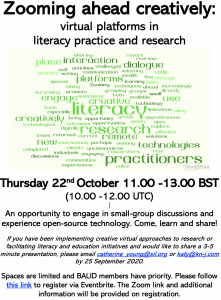 22 October 2020: ZOOMING AHEAD CREATIVELY: Virtual platforms in literacy practice and research
22 October 2020: ZOOMING AHEAD CREATIVELY: Virtual platforms in literacy practice and research
KATY NEWELL-JONES AND CATHERINE YOUNG led this very participative webinar. Special thanks for stimulating and informative presentations are due to our two speakers:
- Donna Moore, Adult Literacy and Numeracy Development Worker at Glasgow Women’s Library
- Martha Young-Scholten, Professor of Second Language Acquisition at Newcastle University.
What was especially exciting was that the webinar showcased the ways to use open-source technology such as Jamboard and Mentimeter. This was a great opportunity to engage in small-group discussions for maximum peer-learning and sharing.
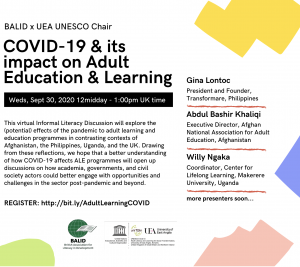 30 September 2020: COVID-19 AND ITS IMPACT ON ADULT LEARNING
30 September 2020: COVID-19 AND ITS IMPACT ON ADULT LEARNING
THIS ONE-HOUR WEBINAR featured key researchers from The Philippines, Afghanistan and Uganda. Thanks to our UEA partners and the wonders of technology, you can watch a recording of the webinar here. Dr Willy Ngaka, our presenter from Uganda, has very kindly shared a downloadable copy of his presentation. We suggest you’ll also enjoy reading our latest BALID blog which addresses similar issues.
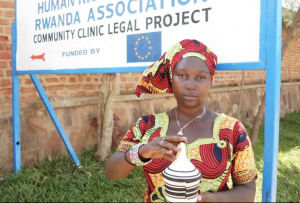 ON 6 MAY 2020 CHRIS MILLORA, our incoming chair, hosted a webinar on the theme of Literacy and the Law in Rwanda. Our presenter was Louis Busingye, co-ordinator of Human Rights First Rwanda Association (HRFRA). We are very grateful to the UNESCO Chair at the University of East Anglia, UK, for making the event possible. Thanks too to our respondents Anuprita Shukla, Alice Copping and Alex Mugabo for their part in the success of the webinar, which attracted over 60 participants from all over the world.
ON 6 MAY 2020 CHRIS MILLORA, our incoming chair, hosted a webinar on the theme of Literacy and the Law in Rwanda. Our presenter was Louis Busingye, co-ordinator of Human Rights First Rwanda Association (HRFRA). We are very grateful to the UNESCO Chair at the University of East Anglia, UK, for making the event possible. Thanks too to our respondents Anuprita Shukla, Alice Copping and Alex Mugabo for their part in the success of the webinar, which attracted over 60 participants from all over the world.
LITERACY AS SOCIAL PRACTICE conference, 9 December 2019, King’s College, London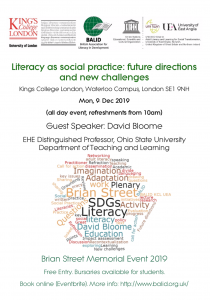
THIS SUCCESSFUL ALL-DAY CONFERENCE included the annual Brian Street Memorial Lecture at King’s College, London. Our guest speaker was Professor David Bloome of Ohio State University, and his talk was followed by cameo presentations by current PhD students. As you will see from our report, the day offered a great opportunity for discussion, sharing and networking, and it concluded with calls for action in the context of the SDGs and literacy.
BALID 2018-19 AGM, 9 December 2019, King’s College, London
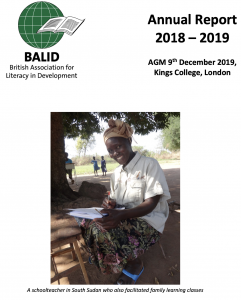 OUR 2019 ANNUAL REPORT, which was presented at our AGM, offers great insight into our activities over the past year – even we on the committee were surprised by the breadth and depth of our work, which is all voluntary.
OUR 2019 ANNUAL REPORT, which was presented at our AGM, offers great insight into our activities over the past year – even we on the committee were surprised by the breadth and depth of our work, which is all voluntary.
Our long-standing chair and secretary stood down from their official positions after many years of faithful service, but we are thankful that both will continue on the committee. We are also sad to lose Lorena Sanchez, our dynamic student representative. We have now been joined by five new committee members drawn from a wide spectrum of the literacy community, including members from The Philippines, Afghanistan and the UK.
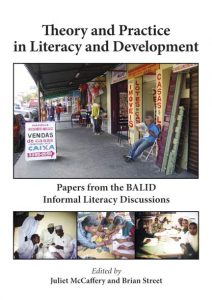 THEORY AND PRACTICE IN LITERACY AND DEVELOPMENT
THEORY AND PRACTICE IN LITERACY AND DEVELOPMENT
IN 2017 WE PUBLISHED the second edition of our BALID book, Theory and Practice in Literacy and Development, which is freely downloadable. This is a compilation of articles based on the presentations given by literacy experts at our series of Informal Literacy Discussions in London, UK, from 2011-2015. Edited by Dr Juliet McCaffery and Professor Brian Street, the book offers helpful and varied insights into issues of literacy, focusing mainly on the social practice view of literacy for families and adults. We have a few hard copies available: they cost £15 (plus £2.25 for UK packaging and postage) and can be ordered from Dr Ian Cheffy at
PROFESSOR BRIAN STREET
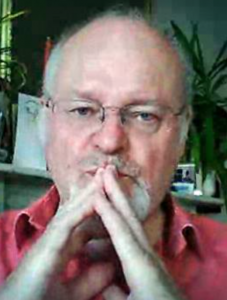 PROFESSOR BRIAN STREET, our long-time President, champion and inspiration, died peacefully on 21 June 2017 after a long battle with cancer. He is very sadly missed, and we have instituted an annual memorial lecture in his honour. Brian will be remembered by all his former students and his professional colleagues for the help, support and encouragement he unfailingly gave them. He will live on through his many publications and his seminal work on developing the theory of literacy as social practice.
PROFESSOR BRIAN STREET, our long-time President, champion and inspiration, died peacefully on 21 June 2017 after a long battle with cancer. He is very sadly missed, and we have instituted an annual memorial lecture in his honour. Brian will be remembered by all his former students and his professional colleagues for the help, support and encouragement he unfailingly gave them. He will live on through his many publications and his seminal work on developing the theory of literacy as social practice.
In addition to the Informal Literacy Discussions that we have been running for many years, BALID has organised several seminars in the UK, which are listed below: please make sure you follow the links to the full reports. In the past we have also organised conferences both in the UK and abroad, and this is something that we hope to revive.
Weaving Literacy through Lifelong Learning (2016)
The full report of our all-day seminar held on Friday 18th November 2016, at the UCL Institute of Education in London, UK, is now available. The day provided a vibrant and creative forum for multi-sectoral dialogue, exploring the role of literacy in enhancing lifelong learning. It was chaired by Professor Alan Tuckett and our keynote speaker was Dr Ulrike Hanemann of UNESCO’s Institute for Lifelong Learning (UIL). Please do watch the snippets of our discussions and the key points made by Dr Ulrike Hanemann. This seminar was organised in conjunction with the UCL Institute of Education, BAICE, and the UIL in Hamburg.
Dr Hanemann has recently published an article entitled ‘Lifelong Literacy: some trends and issues in conceptualising and operationalising literacy from a lifelong learning perspective’ in the International Review of Education. Here is the abstract from her article.
In a fast-changing and highly inequitable world, lifelong learning is becoming increasingly important, not only as a key organising principle for all forms of education and learning but also as an absolute necessity for everyone. It is particularly important for disadvantaged individuals and groups who have been excluded from or failed to acquire basic competencies through formal schooling. Within a lifelong learning framework, literacy and numeracy are viewed as foundation skills which are the core of basic education and indispensable to full participation in society. This article discusses recent developments in conceptualising literacy as a foundation of lifelong learning. Starting from the evolving notions of adult literacy, the author identifies some current trends, the most important being that literacy is now perceived as a learning continuum of different proficiency levels. Dichotomous states of being either “literate” or “illiterate” no longer apply. She analyses (1) findings extracted from UNESCO Member States’ national reports submitted to the UNESCO Institute for Lifelong Learning (UIL) for the 2nd Global Report on Adult Learning and Education; (2) a desk study of national literacy campaigns and programmes as well as (3) some recent developments in formal education. Her suggested three-dimensional analytical framework considers literacy as a lifelong and life-wide learning process and as part of lifelong learning systems. She draws a number of conclusions for policy and practice of literacy as a foundation of lifelong learning. These conclusions are a timely contribution to the ongoing post-2015 education debate, in particular to the challenge of how to mainstream youth and adult literacy into the implementation of the sustainable development agenda for 2015–2030.
An Uppingham Seminar was held from 7-9 April 2016 under the title ‘The sustainable Eduation Development Goals and Adult Learning Programmes: why have adults largely been excluded in the past and are there signs of a change?’ For more information, please email
Bridging the Gap (2015)
BALID and The Literacy Working Group (LWG) supported by NIACE and BAICE, linked up with the University of East Anglia (UEA), in order to organise three free ‘Bridging the Gap’ seminars addressing the issue of dialogue and cooperation between researchers and NGOs in the field of women’s literacy. The first was held at the UKFIET conference in Oxford in September 2015, the second was at UEA on 23rd October, and the last was held on 26th November at The Mothers’ Union in London. Please do read the full report.
BAICE Thematic Forum: Invisible or hidden? Challenging discourses around ‘skills deficit‘, was held on Wednesday 6th May 2015 at the University of East Anglia (UEA), UK.
